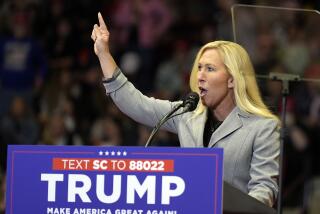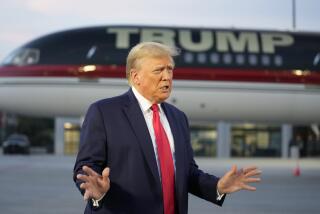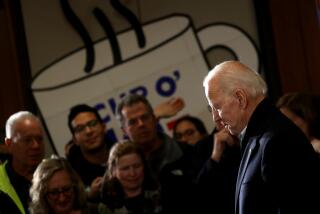Wealth Robs the Unwealthy of Voting Clout : Rich contributors decide most primaries; this can be corrected.
- Share via
In 1953, the Supreme Court struck down, as violative of the constitutional guarantee of equal protection, the last vestiges of the white primary, a candidate-nominating process that excluded African-American voters and candidates based on their race. Today, the wealth primary, a candidate-nominating process that excludes poor and working people of all races, has replaced the white primary as the principal instrument of anti-democratic exclusion.
In the wealth primary, big-money donors select and finance candidates for local, state and federal office. The candidates who win the wealth primary--who raise the most money or who are independently wealthy--usually go on to win the actual party primary and the general election.
Most Americans do not have the money to be heard in this exclusionary process. Thus, like its predecessor, the wealth primary violates the constitutional guarantee of equal protection for all, as it discriminates against poorer candidates and voters. Similarly, the wealth primary stands as a barrier to meaningful participation in the electoral process.
The modern Supreme Court has long been hostile to the placement of financial obstacles in the paths of voters. In 1966, two years after the 24th Amendment banned poll taxes in federal elections, the Supreme Court struck down Virginia’s poll tax. Justice William O. Douglas wrote that “a state violates the equal protection clause of the 14th Amendment whenever it makes the affluence of the voter or payment of any fee an electoral standard. Voter qualifications have no relation to wealth. . . . “ Likening wealth to race, he declared that wealth was a factor “not germane to one’s ability to participate intelligently in the electoral process.”
Six years later, the court articulated that principle in striking down further filing fees, ranging as high as $8,900, that the state of Texas required primary candidates to pay to their political parties. “(W)e would ignore reality,” Chief Justice Warren Burger wrote, “were we not to recognize that this system falls with unequal weight on voters, as well as candidates, according to their economic status.”
When we look at the workings of the wealth primary on the federal level--the current campaign finance system for congressional candidates--we find that it, too, “falls with unequal weight on voters, as well as candidates, according to their economic status.” According to the Center for Responsive Politics, a nonprofit research group in Washington, 81% of all money raised for House and Senate races in 1992 came from less than 1% of the nation’s population in amounts of at least $200. Beverly Hills, a community of 31,000, produced double the number of federal campaign contributions in 1992 as the entire city of San Diego, population 1.1 million.
Private money serves as a decisive factor in the outcome of elections. In 388 of 435 House races in 1992, the candidate who spent the most won. In the 36 Senate races, 31 of the winners outspent their opponents. The costs of running for federal office have soared to the point that most people of average means cannot even contemplate candidacy. In 1992, a seat in the Senate cost, on average, $3.9 million to win; in the House, $543,000.
Until now, the constitutional questions about our campaign finance system have narrowly focused on the First Amendment rights of well-financed candidates and wealthy contributors. This is due, in large part, to a dubious 1976 Supreme Court decision holding that the expenditure of private money in elections deserved the strictest protection under the First Amendment, and that congressional limits on such expenditures were unconstitutional. It is time to pose a wholly new question: whether our campaign finance system comports with the requirements of the equal protection clause. When we pose this question, the wealth primary is doomed.
Striking down the wealth primary, however, does not necessarily require a reversal of the 1976 decision, though such a reversal ought to someday occur. Rather, for those shut out of the wealth primary, equal protection means, at minimum, a voluntary public financing system that makes their exclusion irrelevant to the overall electoral process. The purported First Amendment rights of those participating in the wealth primary would be unaffected; they could keep spending to the heavens. But, with a system of democratically financed elections in place, no longer would this exclusionary private process infringe on the rights of equal participation for citizens without wealth.
More to Read
Get the L.A. Times Politics newsletter
Deeply reported insights into legislation, politics and policy from Sacramento, Washington and beyond. In your inbox twice per week.
You may occasionally receive promotional content from the Los Angeles Times.









